Railworkers' Fight for Safe Working Conditions
"Join Our Fight and Take This All the Way," Teamsters Say

Picket in support of rail
workers at MP Randy Boissonnault's Edmonton office, August 29,
2024
 More than $1 billion of goods are moved by rail in Canada every
day. It
is such a significant sector of the economy but the railway
barons are
only interested in how much money they make, not the well-being
of
Canadians or the people in the U.S. either, through whose
territory
they also
operate.
More than $1 billion of goods are moved by rail in Canada every
day. It
is such a significant sector of the economy but the railway
barons are
only interested in how much money they make, not the well-being
of
Canadians or the people in the U.S. either, through whose
territory
they also
operate.
Canada's two major railways have never had a simultaneous work stoppage before. Contract talks between the rail union and Canadian National (CN) and Canadian Pacific Kansas City (CPKC, formerly Canadian Pacific) usually take place a year apart. But in 2022, after the federal government introduced new rules on fatigue, CN requested a year-long extension to its existing deal rather than negotiate a new one. After a year of the railways not bargaining for a new contract in good faith, the union at both railways engaged in job action at the same time, and in less than 17 hours, the Canada Industrial Relations Board (CIRB) ordered 9,300 rail workers back to work.
When Labour Minister Steve MacKinnon skirted the collective-bargaining process and sent the dispute to final arbitration, he sputtered that the government was "confronted with exceptional circumstances" and that the decision to send the matter to the CIRB was done with everyone's best interests in mind.
 MP Randy Boissonnault's Edmonton
office, August 29, 2024
MP Randy Boissonnault's Edmonton
office, August 29, 2024
He remained silent about the refusal of the railway barons to address the major issue that has stalled contract talks for months which is worker safety and the related safety of the public. The union informed that the railway barons were trying to overcome a labour shortage by making employees work longer days, farther from home. CN and CPKC insisted their offers ensure safety despite the ample proof the workers provide that this is not the case.
"This all goes back to an individual named Hunter Harrison who became the executive of CN [in 2003]," pointed out Bruce Curran, associate professor in the faculty of law at the University of Manitoba, when interviewed for the Globe and Mail's podcast series The Decibel. "He implemented something known as precision scheduled railroading -- a lean system of management where railways work with as few crew as possible to drive inefficiencies out of the system. This has led to massive layoffs across the railways, and has led to the workers who remain working longer hours and beyond the point of good decision-making, where fatigue may be an issue."
With regard to the role of fatigue in rail accidents, Curran said: "Since 1990, there have been more than 30 rail disasters in Canada. In virtually all of them, investigations have pointed to fatigue as a major contributing factor. In July 2013, a railway car carrying 72 tankers of volatile shale oil derailed and exploded in Lac-Mégantic. It killed 47 people, spilled a record 6 million litres of oil and incinerated the town centre. Substantial evidence points to fatigue being a major factor. The engineer who was primarily responsible -- because he allegedly improperly applied the brake -- had been awake for more than 17 hours. And that has a severe impact on cognitive functioning and decision-making."
Another factor swept under the rug is the corrupt "revolving door" between industry and government. Former Conservative Member of Parliament John Baird presently sits on the CPKC's board of directors. He joined the Canadian Pacific board in 2015 after resigning from the Harper government in February of that year, prior to the federal election which brought the Liberals to power. He is also currently Chair of CPKC's Corporate Governance, Nominating and Social Responsibility Committee and of its Risk and Sustainability Committee.
Under the Harper government, Baird served as Minister of Foreign Affairs; Minister of the Environment; Minister of Transport, Infrastructure and Communities; and President of the Treasury Board. It was the Harper government, when Baird was Transport Minister from 2008 to 2010, that gave the railway barons the power to write their own rules and carry out their own inspections, thereby limiting Transport Canada's mandate to the simple oversight of the railway companies' operations.[1][2]

Information picket in
Hornepayne, August 29, 2024
Referring to the refusal of the railway barons to negotiate with their union, Teamsters Canada Rail Conference (TCRC) President Paul Boucher said in a press release:
"Throughout this process, CN and CPKC have shown themselves willing to compromise rail safety and tear families apart to earn an extra buck. The railroads don't care about farmers, small businesses, supply chains, or their own employees. Their sole focus is boosting their bottom line, even if it means jeopardizing the entire economy."
"What they have done to the railworkers ... to stop the work stoppages fundamentally takes rights away from the rights to free collective bargaining, and we're protesting against that," Boucher said in an interview.
The TCRC president also said that the union would work with other labour groups as it mounts a legal challenge to the decision that halted work stoppages at the country's two largest railways and imposed arbitration.
A decision obliging over 9,000 Canadian rail workers to stay on the job is a win for the railways and could impact bargaining in other federally regulated sectors like aviation, Boucher pointed out.
"Any federally regulated company, it's a win for them at this point," Boucher said, adding: "This is disastrous for labour, for workers."
The Teamsters are planning on appealing the decision at the Federal Court. Other unions could participate in court and support them, Boucher said. He also informed that he has been in contact with the Airline Pilots Association of Canada (ALPA), the union representing more than 5,400 Air Canada pilots who voted 98 per cent in favour of authorizing job action under the Canada Labour Code on August 22.
"This historical moment is so extremely important that labour needs to get involved, and they will," Boucher declared. "We're going to be calling on all labour across Canada to join our fight and take this all the way," he said.
For his part, ALPA President Tim Perry, said: "The new minister of labour does not trust the Canadian laws governing collective bargaining, nor does the government he represents respect the constitutional rights of workers."
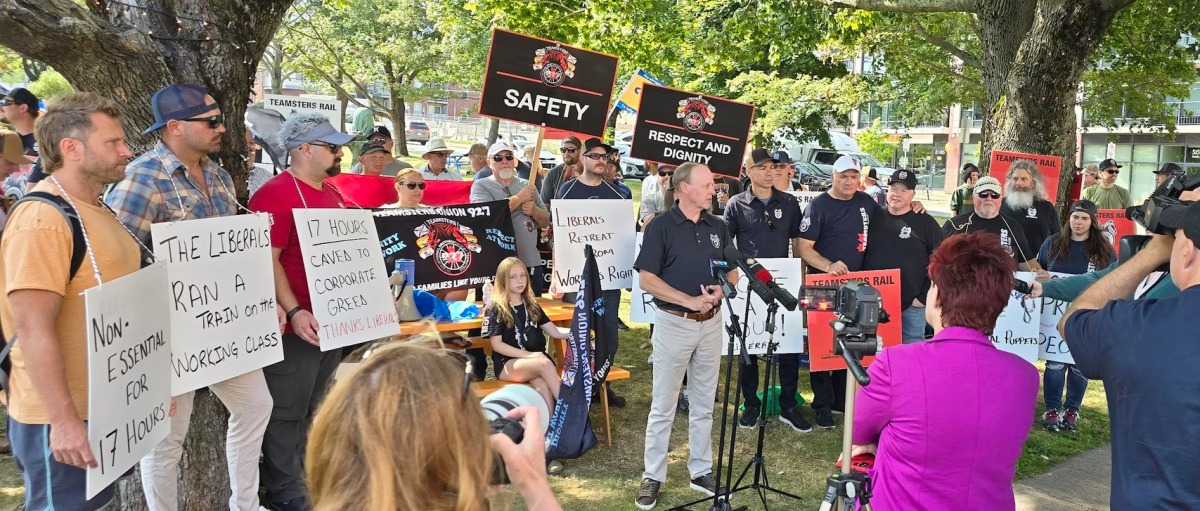
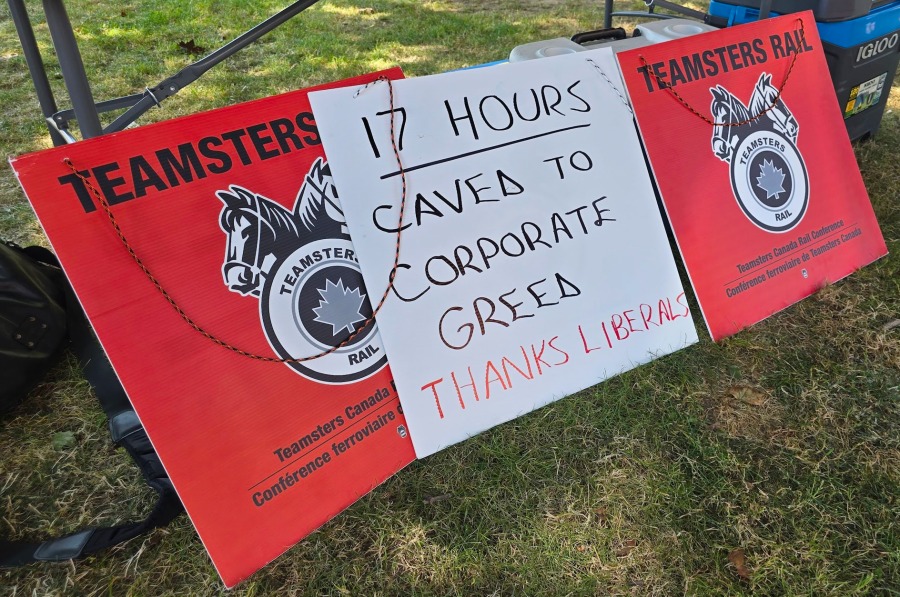
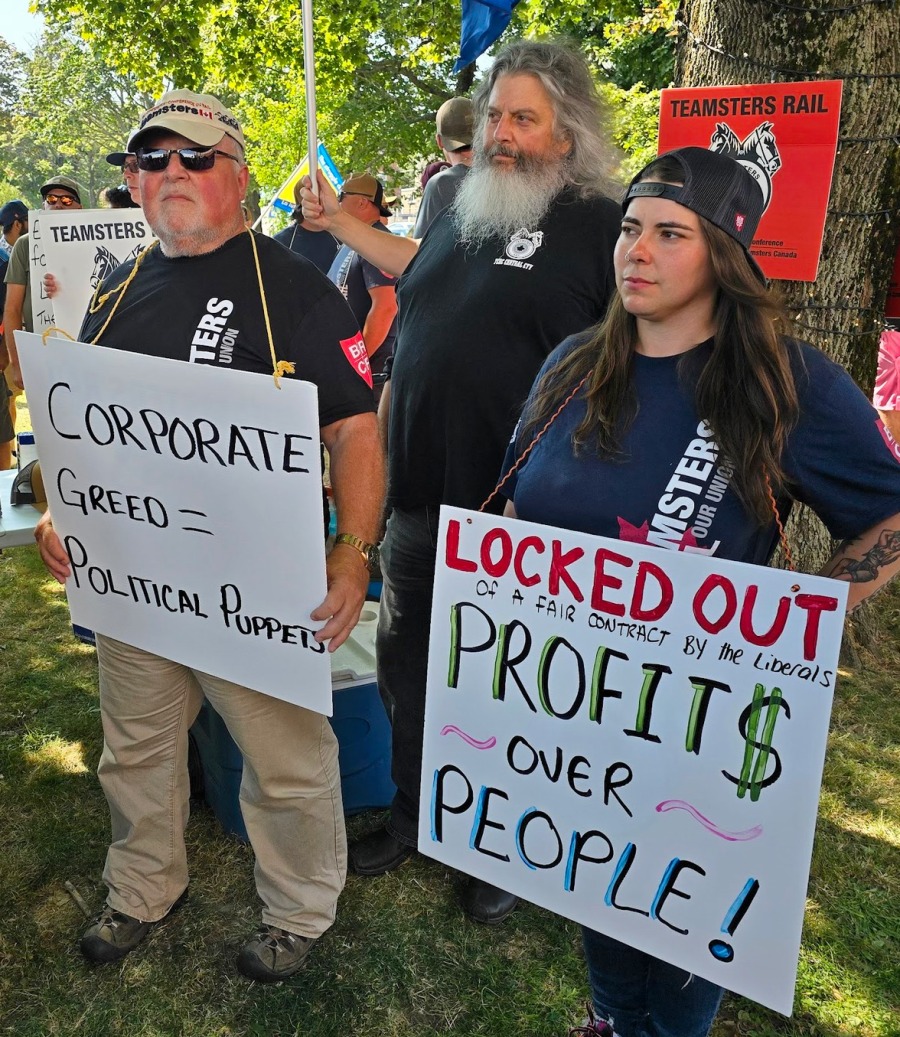
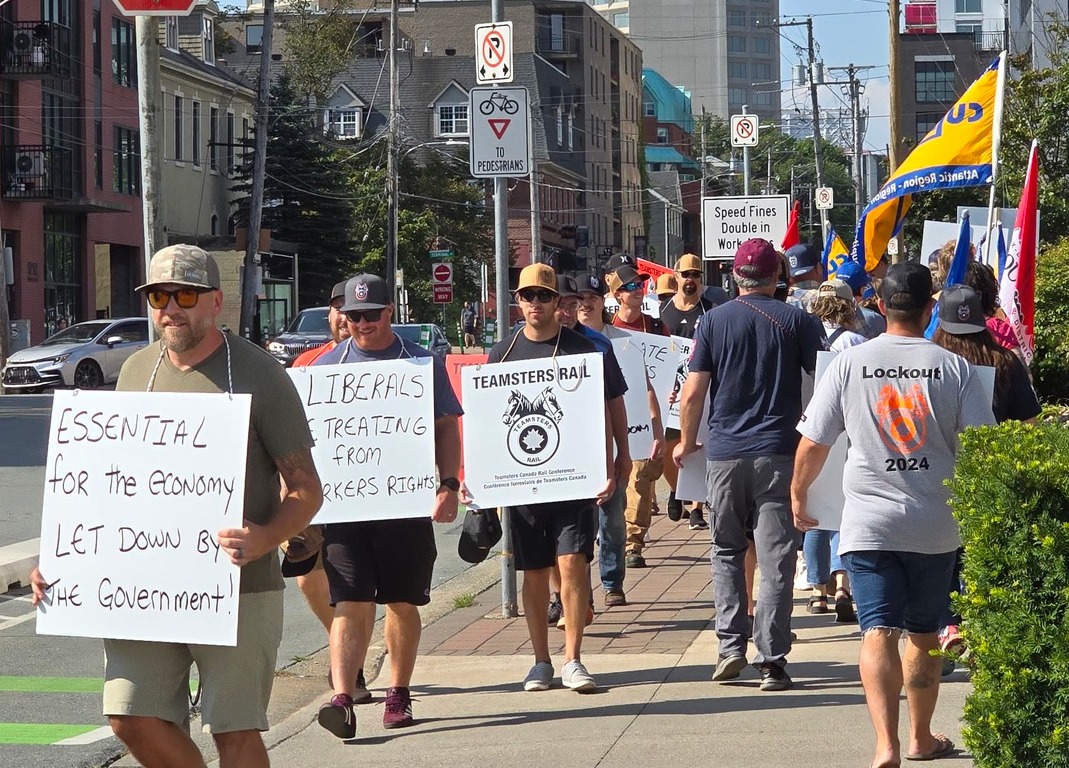
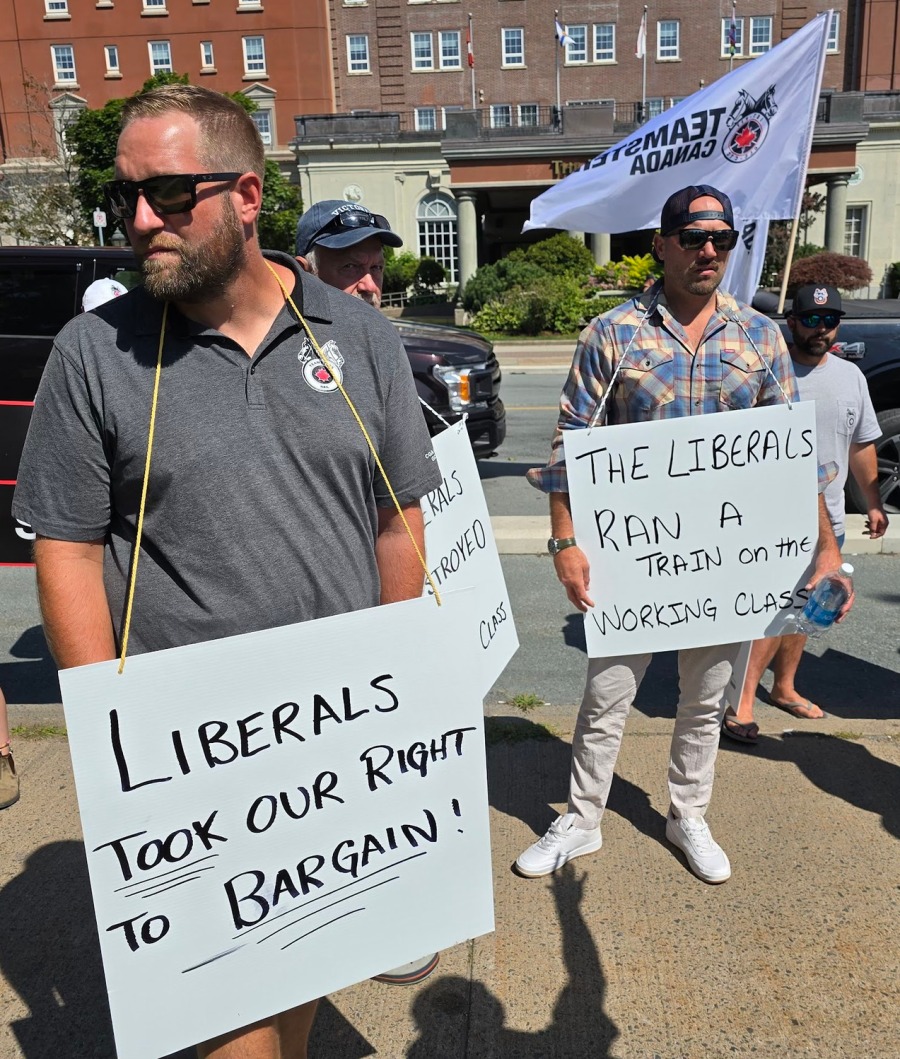
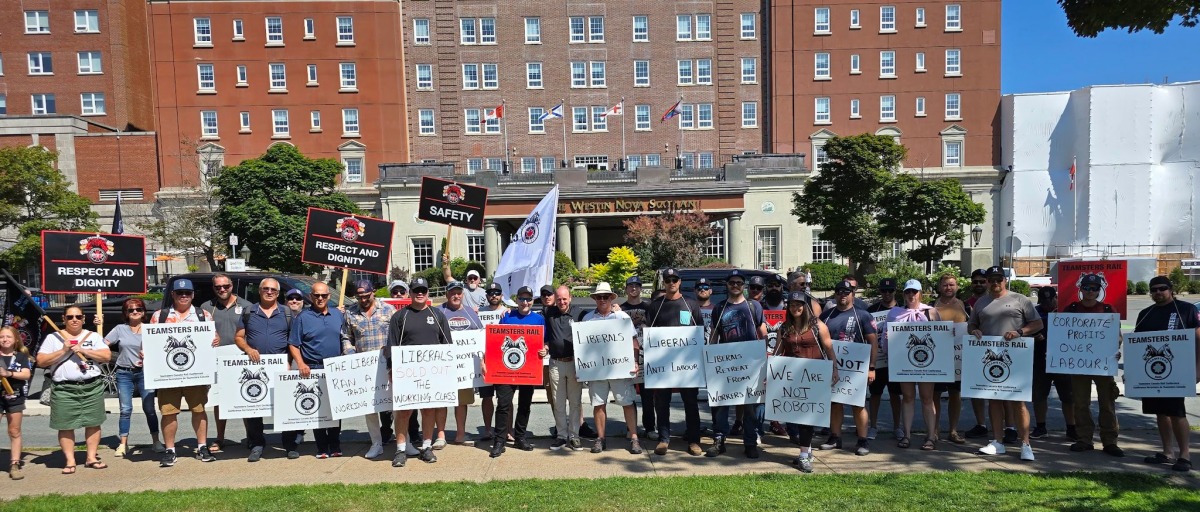
Rail workers picket
outside Liberal cabinet retreat in Halifax, August 27, 2024.
This article was published in

Volume 54
Number 46 - September 1, 2024
Article Link:
https://cpcml.ca/Tmlm2024/Articles/MS54462.HTM
Website: www.cpcml.ca Email: editor@cpcml.ca

